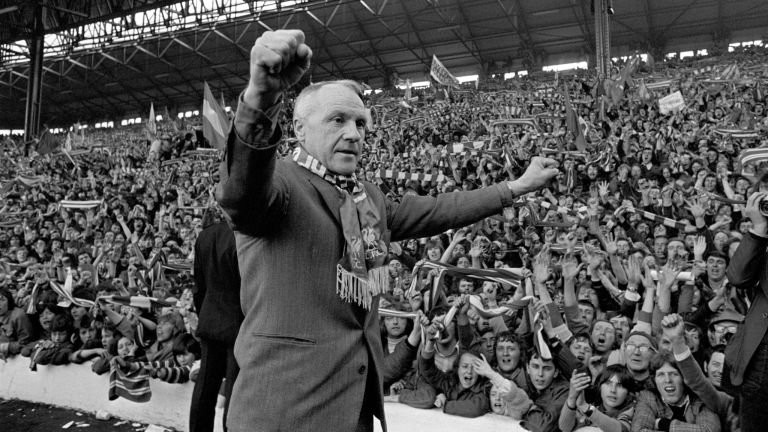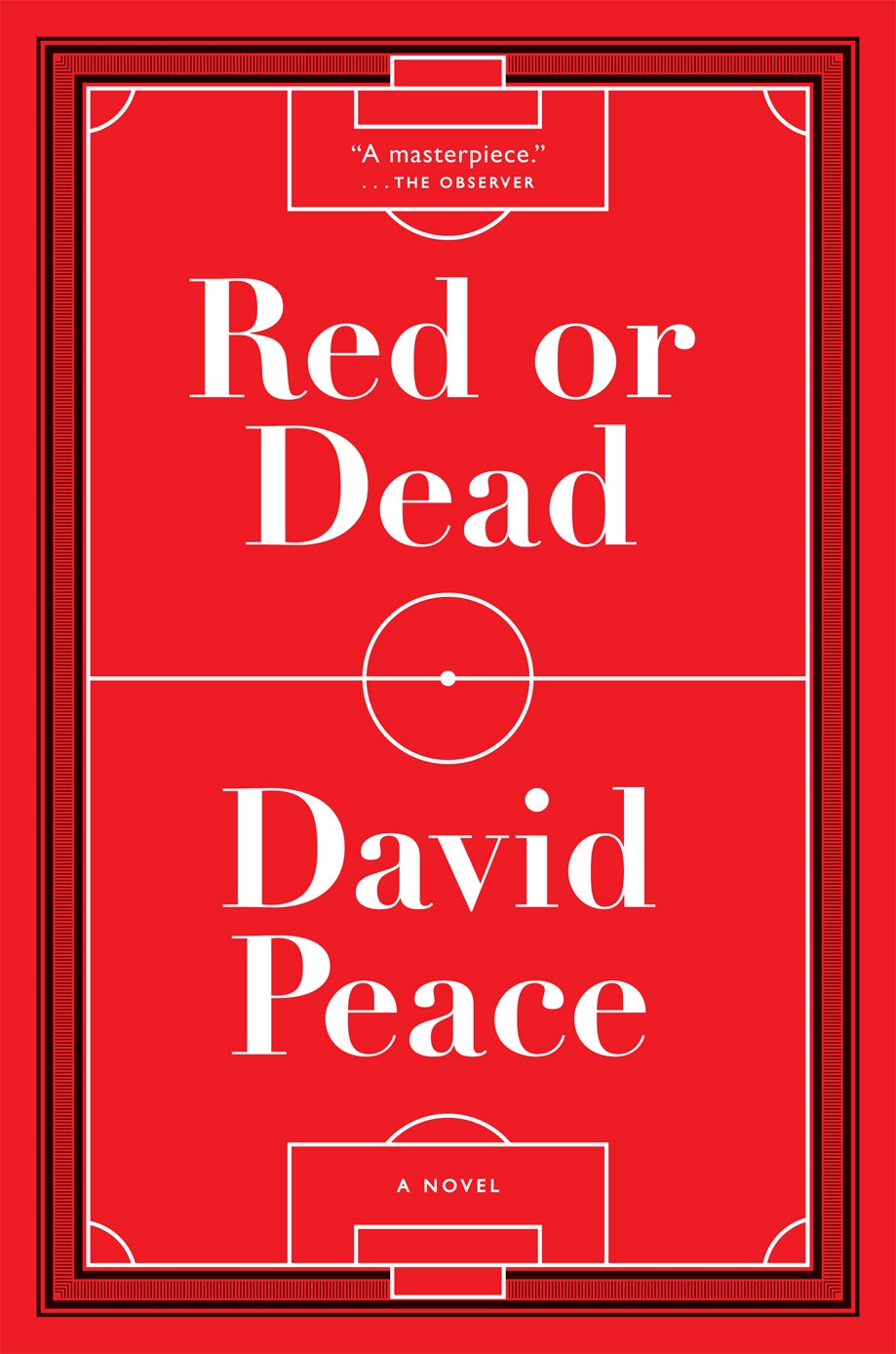Introducing Howler Book Club and the brilliant novel that kicks it off

We’re beyond excited to announce the start of Howler Book Club. Each month we’ll select a soccer book—new or not so new—that’s worthy of your time and our spotlight. Throughout the month we’ll have different features on www.whatahowler.com and the Dummy podcast about the book, culminating in a grand finale that will hopefully include the author (if they are alive and willing). So read along with us! There aren’t any tests and you won’t have to get in front of the class to give a report at the end. We promise. And so, without further ado, here’s Dennie Wendt’s review of our Howler Book Club selection for November. —Brooks
Red or Dead (Melville House, 2014), by David Peace [Buy it here]

Red or Dead, a strange, poetic, wondrous novel by David Peace about Liverpool’s Bill Shankly, is driven by the faith in the intrinsic goodness of football (whether he shares this faith with his subject I’m not quite sure), which is to say that it is a religious document, which is to say that it’s not for everyone. I’m not even sure its author intended it to be religious — it is, after all, a loving tribute to a known Socialist — but the author does kick it off with a quotation from the Book of Revelation, so I believe I’m drawing a fair inference. In any case, I loved it.
Peace has spelled out the deep spirituality of football as clearly as any religious leader could hope to do. Blessed David Peace, the author of the finest piece of soccer fiction I’ve ever read, The Damned Utd, which is barely a soccer book at all but a fable of pride going before the fall (and therefore is for everyone), has now written a 720-page incantation based upon Our Game, as seen through the eyes of the mystic manager Shankly. From the first paragraph, it reads as if a priest were offering Mass: “In the winter-time, in the night-time, they remembered him. And then they came to him. In the winter-time, in the night-time. Not cap in hand, not on bended knee. Not this sort. But still they came. Here to Leeds Road, Huddersfield. Here on October 17, 1959. They came — In the winter-time, in the night-time.”
On page 158, Peace is still at it, still mesmerizing with further verses of his epic poem: “In the winter-time. In the ice and in the snow. Liverpool Football Club travelled to Belgium. And Liverpool Football Club knocked Anderlecht out of the European Cup. They travelled to Burnley. And they beat Burnley Football Club. They beat Blackburn Rovers, they beat Sunderland Football Club. They beat Sheffield Wednesday and they beat Blackpool Football Club. They knocked West Bromwich Albion out of the FA Cup. They knocked out Stockport County and they knocked out Bolton Wanderers — In the winter time. In the ice and in the snow.”
https://www.whatahowler.com/reading-the-game-tracing-the-evolution-of-soccer-literature-d994e61da6dd
He’s writing the Old Testament of Football, and Bill Shankly is his Moses. And his Job. Peace’s invitation is to see in Shankly’s construction of Liverpool Football Club the same affirming mythology. To anyone willing to let this book wash over them, the game is spirituality itself — nuance and legend, grueling asceticism and rapturous joy. I am with the author here: at home in the game’s rhythms, its demand of constant imagination, its delayed gratifications, its patience, its disappointments — just as others find traces of wisdom and reminders of humility in going to church, or in golf, jazz, painting, raising their dogs, or gardening. Bless them all, all those golfers and painters and gardeners. I would never dream of trying to force the oddity of my affections upon them. Not now anyway. I used to be like that. If that’s where they get it, good for them. I get it — some of it anyway, and for who knows what funny old reason — from the Funny Old Game.
On page 333, Peace writes, “…on Boxing Day, 1970, in blizzards and in ice, Stoke City came to Anfield, Liverpool. That afternoon, in the blizzards and in the ice, forty-seven thousand, one hundred and three folk came, too. But in the blizzards and in the ice, Liverpool Football Club did not score. And Stoke City did not score. And in the blizzards and in the ice, Liverpool Football Club drew nil-nil with Stoke City. At home, at Anfield.” Red or Dead carries on like that, page after page after page, listing players, listing opponents, listing and listing, saying the same things over and over again, daring the penitent to break faith.

By way of example, on page 467, Liverpool plays the first leg of the Second Round of the European Cup against Red Star in Belgrade. Here is Peace’s description of the hosts’ first goal: “Petrović passed to Lazarević, Lazarević passed to Janković. Janković passed back to Lazarević. Lazarević back-heeled the ball to Karasi. Karasi passed to Janković. And Janković shot and Janković scored.” (There’s not a writing group in the world that would let you get away with that.)
I could imagine the moment: I have been in Red Star’s stadium. A giant old Socialist bowl. Peace’s poetry took me back there. I saw the goal from high up in the bowl, where I had stood once for a Yugoslavia-England Euro qualifier in 1987. A page later, Peace lays out the defeat Liverpool suffered against Red Star at home, at Anfield, where I have never been, in the second leg, and I thought to look it up on YouTube. The Belgrade highlights are in Communist black and white, but the Liverpool match is in full early-’70s BBC color. It’s a fifteen-minute highlight reel, and it’s like a holy tablet unearthed from the side of a hill. In it you can see the game’s past: the simple, crew-necked kits (red vs. white — Red Star doesn’t even have a badge on their plain white jersey), the soft, slow grass, the exposed dirt in the goalmouth, goalkeepers scooping up back passes. And the future: free-flowing, fast, skillful play; one nation’s style pressed up against another’s; behind the goals the unmanaged crush and flow of humanity just a few years away from inevitable, hideous, somehow unforeseen disaster. The match is tense and beautiful, accented by the plummy tones of the solo and subdued English announcer who manages the Serbian names with gentility and respect; when Janković scores a late free kick to put Liverpool out of the tournament, in spite of so clearly wanting Liverpool to win, the commentator lets out a surprised and joyful, “Oh, yes! What a tremendous shot from Janković!” All 15:10 is deeply satisfying viewing, like music or a good sermon or a conversation with a friend.
You can look up Shankly’s tale for yourself, or you may already know it. The book plays it out to the complicated end, along the way containing a multitude of episodes similar to the Red Star adventure. Even if you don’t know the basics of it already, you likely know his famous quote: “Some people believe football is a matter of life and death. I am very disappointed with that attitude. I can assure you it is much, much more important than that.” To get there, to a place where a game, this game, can provide sufficient spiritual guidance to accompany you on your journey from life to death, absent a god to believe in, Peace knows and Shankly teaches that you’ve got to earn it. Through repetition, or as the author has it in the book’s first three words: “Repetition. Repetition. Repetition.” In the winter-time, in the night-time, in the blizzards, and in the ice, in the soft, slow grass, until finally, and only maybe, Oh, Yes!
https://www.whatahowler.com/reading-the-game-tracing-the-evolution-of-soccer-literature-d994e61da6dd

Dennie Wendt is a twenty-year veteran of storytelling in the shoe (and soccer) business. He has been a copywriter, a creative director, and marketing guy, mostly for Nike and Converse. He spent a year in the ’80s on the junior team at Proleter Zrenjanin, when that was still Yugoslavia. He’s written for Salon, Portland Magazine, the Portland Timbers’ official website, and has a book, “Hooper’s Revolution: A Story of Soccer, the ’70s, & America,” forthcoming in April 2017 from Unnamed Press.
